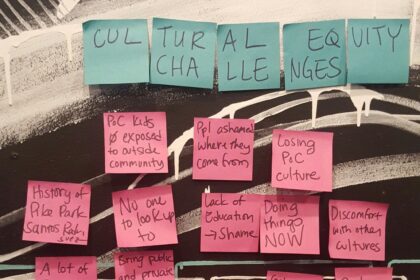Politics is not Ontology: An Interview with Susan Buck-Morss
Grant Kester
GK: The first point of A Commonist Ethics is “politics is not ontology”. Could you talk a bit more about the relationship between politics and ontology? One might argue that ontology functions to provide a kind of metaphysical guarantee, or perhaps reassurance, about some fundamental human capacity that can be salvaged or defended. Once we abandon ontology, though, is there still a political need for some more historically stable or consistent set of values, around justice or the human capacity for creative transformation? Or do you feel that these values will necessarily emerge from the practice of political resistance itself? Put another way, do we need an ontological framework of some kind in order to facilitate solidarity, either in the present (via concepts like “social labor” in the Marxist tradition) or with past moments of resistance (i.e., an anamnestic solidarity)?
SBM: “Ontology” is a slippery term. It focuses on that most banal of words: “is”—the verb “to be.” But since Heidegger, the term has become heavily laden with unnecessary profundity. Very briefly: For Heidegger, being—that which is—is an ontic statement of what exists; whereas Being with a capital B is essence, true reality as opposed to mere appearance. The trick with Heidegger is that Being is supposed to be derivable from being. This is the “ontological difference” that Adorno derided so often. To give a concrete example, everyone dies one way or another, so the ontological essence of this fact of existence ends up as Heidegger’s “Being-toward-death”. Well, OK, but if you are poor, if you are a young black man, if you are an army private, your being-toward-death may be a lot closer than it is for others. Critical theorists have modified the phenomenological claim: social ontology allows us to consider these categories of difference. But my point is that the critical force of “social” here, which makes the statement more than a positivist fact, has to come from elsewhere—from politics, ethics, morality, religion—you name it, but it can’t come from the ontological claim. This is true of Marx as well. Many people acknowledge the explanatory power of Marx’s concepts—alienation, exploitation, class divisions—but this does not automatically lead them to protest against those problems. Rather than starting with definitions of justice, or “human capacities for change,” or human nature at all, I would imagine politics as a strenuous attempt to learn ways around our differences by changing the questions, dealing with our own contexts as if they were strange, in need of ethnographic analysis—in short, actions, practices, not Being.
GK: You describe the “worn out hinge” of the relationship between philosophy and other disciplines, especially the social sciences. Is there any way to repair this hinge? How would philosophy and the social sciences need to change to do so? And if we are to gain insight from political practice or demos itself, via a form of plumpes Denken, don’t we need a more diverse set of analytic tools (including, for example, some of the empirical data collection methodologies associated with the social sciences)?
SBM: You know my preference for historical data, rather than data collected by the social sciences. And historical knowledge has exploded because of the internet. I predict a real renaissance of the discipline of history, which got bogged down in “narrativity” and “futurity” and a bunch of other neologisms. I mean, you can do a Google search today that shows connections once existed between phenomena you never thought of juxtaposing. And you bring up the demos’ political practice (a reference to Rancière?)—I taught Kristen Ross’s book, Communal Luxury, on the insurrectionists’ learning-by-doing during the Paris Commune. My graduate seminar fell in love with it. But their praxis, studying for a Ph.D., is in stark opposition to that intelligentsia-hostile dream.
I don’t think you can develop a political practice “as radical as reality itself” (Lenin) if you haven’t already done the mental labor of critical reflection. You need to know that what we take to be natural and necessary, the given world, has evolved historically. If it seems impervious to change, this is just because it has been around so long as to become what Lukács called “second nature.” Nietzsche described this reified history as “hard-baked.” As a bad cook, I understand that.
GK: In the interview I conducted with you in 1997 (“Aesthetics after the End of Art,” Art Journal, Spring 1997) you describe the aesthetic in terms of a somatic or bodily response to certain forms of political repression or injustice (“sniffing danger,” as you phrase it). This seems consistent with your “Commonist Ethics,” in its concern with the experiential. In the Art Journal interview you spoke of an aesthetics uncoupled from the production of artistic objects and reinvented as a “self reflective cognitive practice,” which makes me think of the dramatic growth of new forms of socially engaged art practice since the 1990s. I wonder if you have any thoughts about the possible relationship between artistic practices and the Movement of the Squares or other recent protest movements in terms of Benjamin’s concept of Spielraum?
SBM: Well I like the formulation that the Movement of the Squares practices produced a kind of “space of play,” in Benjamin’s sense. And of course that is important. But look, something has happened with the video overload produced by the internet. We see so much, it’s hard to experience the act of viewing as more than a blink of comprehension. I really do have trouble looking at contemporary art. It takes an unbelievably talented curator to arrange an exhibition that allows an actual experience of seeing to happen. Most of the time, you just scroll through the images offered up in exhibitions. All the senses are affected by overload. Living in New York City now, I get smell overload every time I venture forth. I don’t think today I could sniff danger, or filter that one quality out of the mix. Images of injustice suffer a second injustice when viewed in this banal way.
I have a renewed respect for words, the right words, to name injustice, or danger, etc. There has been some very good writing relevant to politics and aesthetics. I’m actually a fan of Beyoncé’s literary work in Lemonade. Regarding words, take a look at the website for #Blacklivesmatter: https://policy.m4bl.org. The aesthetic of this website—its dignity, clarity, and measured radicality—strikes me as a real contribution to the landscape of democratic citizenship. But as for “art”—I’m having trouble appreciating “political” art today—Sarah Lucas’ sculptures at the 2015 Venice Biennale, for example . . . a poor iteration of Robert Gober, to my mind. The best show of political art I saw in New York last year was of South American avant-garde art of the 1970s.
GK: I’m also interested in your discussion of the ways in which “emergent” situations can have the effect of transforming subjectivity. What do you feel is the connection between the spatial proximity involved in shared political resistance during moments of emergence (Tahrir Square or OWS, for example), and the “affective, visceral reaction” we have to violence “taken out of context,” which seems to imply a kind of cosmopolitanism? How are the body, affect and cognition mobilized differently in the case of our experience of images of suffering and direct participation or immersion in political action? Is subjectivity transformed differently in each case?
SBM: Well, it’s a bad time to ask me about Tahrir Square. I was extremely optimistic about the cosmopolitan potential of the Arab Spring. Visually, the politics was 100% convincing. But that is only in the virtual reality of global space, minus the overlay of global power realities, and on top of local histories of nationalisms, monarchisms, post-imperialisms. The problem is not only the burden of different histories, different political cultures; it is also the realities of people’s lives, whether they have family members working abroad or with refugee status, whether they know people who have been murdered by their own or other governments, including of course the U.S. When you figure that U.S. weapons (whether in the hands of U.S. solders or not) have killed hundreds and hundreds of thousands of Middle Easterners, mainly civilians, in the past decade (and more!) there develops among the people who live there a very intimate understanding of the images of suffering, that doesn’t go away when the global image-stream turns off.
GK: Given your interest in pragmatics I wonder if you see any connection between your Commonist Ethics and the shift towards an “action-theoretic” orientation in later Frankfurt School research (i.e., Axel Honneth and others)?
SBM: I don’t know these writers well, but well enough to clarify that their social theory approach is stylistically (and therefore philosophically!) antithetical to what I have in mind. The pragmatics that matters to me is to research/write in such a way that the pragmatics, the practice of reading and thinking a text through, is itself the action that counts. Theoretical writing should surprise the reader. Frankfurt-school style today does not make for exciting reading. Studying philosophy should be an action, not an object.
GK: What is the importance for you of “sudden-ness” in political change? And what kind of time frame does it entail? Are sudden shifts more likely to signal deeper or more profound changes in a given system of power? Does their sudden-ness mark a more radical disruption of norms than gradual or cumulative shifts? And isn’t sudden-ness, in at least some cases, an optical effect, since what appears to be a sudden shift is often preceded by a subterranean set of capillary forces? Thus, Donald Trump’s success in the Republican primaries was “sudden,” although it expressed long-existing forces on the right. If insight is generated via pragmatic experience isn’t it possible that longer-term forms of experience are just as likely to produce this new insight? Finally, how does the discourse of sudden-ness or simultaneity relate to your call for the “slowing of time” in new political and social experiments?
SBM: Hmmm. I don’t think I say “sudden-ness,” do I? I wouldn’t make a noun of a temporal qualifier. As for Trump, you are right; he’s a symptom of long-festering forces. So he really isn’t a rupture in the status quo. Yet he is dangerous. Extremely dangerous, and I’m voting for Hillary with no apologies, because the space for radical critique will still exist with her as President. We won’t be locked up or deported for failing a test on ideological beliefs. Progressive changes happen when conditions are overripe—like East and West Germans suddenly starting to walk through the Berlin Wall. That was the kind of sudden event to which I referred.
GK: In “Commonist Ethics” you state, “Never, in my lifetime, has the Marxist critique of capital and its global dynamics seemed more accurate. And never has it seemed more wrong to go back to Marxism in its historical forms.” I’m sure you’re familiar with the various efforts today to reinvent or creatively détourne aspects of communism or Leninism (Zizek’s call for a new Leninist “master,” Badiou’s work, etc.). This is, of course, not a new gesture. In some ways it recalls the “New Times” and Marxism Today debates in the UK during the 1980s, when theorists such as Stuart Hall and others attempted to articulate the ongoing relevance of Marxism in the context of Thatcherism, Post-Fordism and later New Labor. What do you think is different in the most current return to/reinvention of Marx or Lenin?
SBM: Well, this is weird. What if rather than attempting to pull ourselves out of the morass of modernity and Western-centrism by our own pigtail (i.e., by the very concepts of modernity and the West) we acknowledge that history took a wrong turn. Straight into a dead end. We’ve got to retrace our steps and venture forward on different paths that, in our fantasies of history-as-progress, we long ago passed by. And then we might find different connecting links than the ones available to us now. What if we had the kind of historical background that enabled us to juxtapose Thucydides and Flavius Josephus on civil war? Or Karl Marx and Sayyid Qutb on the “bloated capitalists”? Or Aimé Césaire and Kuan-Hsing Chen on de-imperialism? What would that do to loosen up our historically baked minds? Just a thought . . .
Professor Susan Buck-Morss is a trans-disciplinary scholar whose political theory emerges out of a constellation of historical material, visual images, and contemporary events. She is a core faculty member of the CUNY Graduate Center’s Committee on Globalization and Social Change. Her most recent book, Hegel, Haiti, and Universal History (University of Pittsburgh Press, 2009), won the Frantz Fanon Prize Book Prize in 2011. Her book, Thinking Past Terror: Islamism and Critical Theory on the Left (Verso, 2003), has been translated into Hebrew, Urdu, Spanish, Japanese, and Greek. Research for her book Dreamworld and Catastrophe: The Passing of Mass Utopia in East and West (MIT Press, 2000) was funded by awards from the MacArthur Foundation, Rockefeller Foundation, and the Fulbright program. Her early studies on the Frankfurt School are Dialectics of Seeing: Walter Benjamin and the Arcades Project (MIT Press, 1989) and The Origin of Negative Dialectics: Theodor W. Adorno, Walter Benjamin, and the Frankfurt School (Free Press, 1979). A longtime professor at Cornell University’s Department of Government, Buck-Morss was also a member of Cornell’s graduate fields in Comparative Literature, History of Art and Visual Culture, German Studies, and the School of Architecture, Art, and Planning. She lectures and collaborates worldwide on the editorial boards of several journals and has been an invited lecturer at dozens of universities worldwide. Her numerous international awards and fellowships include a Getty Scholar grant and a Guggenheim Fellowship. She holds an M.A. degree from Yale University, studied at the Frankfurt Institut für Sozialforschung, and received her Ph.D. in European intellectual history from Georgetown University. Her website is susanbuckmorss.info











